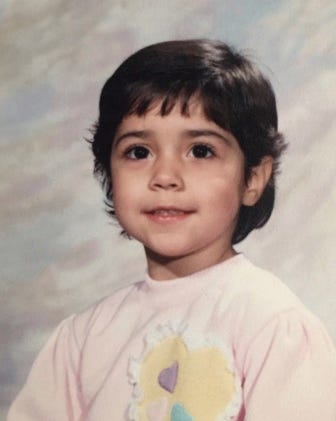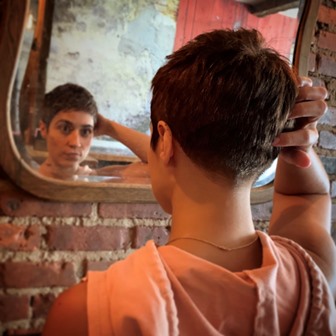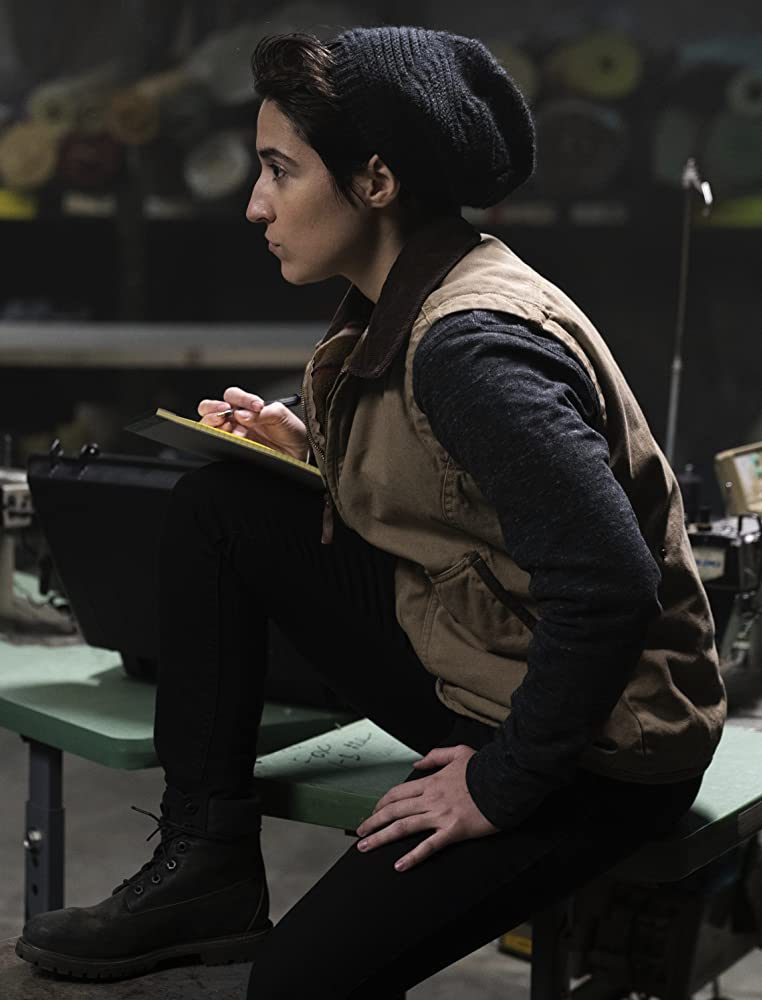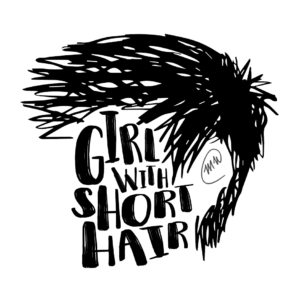“You’re the only girl in the world with short hair.”
My niece said this to me. She was six at the time. I had asked her if she wanted to cut her hair short one day. She laughed as if I had said something profoundly ridiculous. Had I? I asked her. Yes, she said. Why? And that was her response. That I was the only girl in the world with short hair. It was okay for me, because it was me, but definitely not for her, because it was her.
I smiled. The only girl in the world with short hair. Not a terrible thing to be in the eyes of your niece. A rebel, a loner, a maverick. Unfettered by gender norms, unwilling to spend any significant time with a blow dryer. A defiant, short-haired, mad woman raging against a hair culture stuck in a loop of incessant twirling and dramatic flipping and inevitable split ends.
Okay, maybe that’s not exactly how my niece sees it, but that’s how her sentiment made me feel. Alone, awesome, and not afraid of a haircut. It also made me think of what I had been like, at the age of six. I was much like me now, only smaller, but hair just as short, with bangs often wonky. I had thought nothing of it then, so why am I thinking of it so much now?

From as little as I can remember, I wanted short hair. It felt right. My mom says that I used to end up with the most bizarre haircuts as a kid because she would tell hairdressers one thing and I would promptly tell them another. We were also fighting waves and full-blown curls that wanted out. But my mom never fought me about wanting my hair short. Neither did my dad. It was everyone else that did.
Growing up I would look back on moments that could have been scarring with a sort of maniacal glee. Getting called out by a Little League teammate for being a girl who had gotten on the team by pretending to be a boy (I hadn’t and I wasn’t, but his disappointment at not being on an all-boy team satisfied me). A family friend telling me a long, drawn-out story about a female neighbor who looked like a man and why it was important for a woman to not look too much like a man. (I, a child, genuinely thought it was an issue this lady had with her neighbor, not me.) Or proudly showing up to Career Day in elementary school dressed as my father the philosophy professor, in a suit and tie, hair neat and short, complete with briefcase and books he had written, only to be met by a confused class who thought this was my way of telling them I wanted to be a man when I grew up. (I spent all day explaining what a PhD was and how not all doctors work in hospitals.)
Boys have short hair, not girls. I understood that from the beginning. I mean, I must have, because no other girl around me, whether it was in school or on TV or in my favorite movies, had short hair. Short how I liked it short. My eyes told me what my parents thankfully never saw the need to broach. That the world is made up of rules. You break them, you stick out. And I stuck out. But I have no memory of caring all that much. For one, it seemed inconsequential. Hair is hair. The shorter, the better. No room for frills or bows and more time for everything else. It really didn’t bother me at all that I was, as far as I could see, the only girl with short hair.
“Unfettered by gender norms, unwilling to spend any significant time with a blow dryer.
A defiant, short-haired, mad woman…”
If anything, I preferred it. I wore it like a badge of honor. The mark, in my eyes, of a tough girl and avowed tomboy. It was me against the people with endless questions and asinine assumptions that began and ended with the length of the hair on my head. Bizarre, I thought, but not worth the hassle. I wasn’t put here to explain myself or to fit into boxes or to let my hair grow out because it would make boring people a little less uncomfortable. Are you kidding? No. Not me. I had other plans. So with hair short, fists clenched, and eyes big, I took on a world that I didn’t quite get and was pretty sure would never quite get me. It would all work out, thought optimistic, determined, prepubescent me.
Fast forward a good chunk of a lifetime and you find me here now doing the very thing I always thought I had to rage against: explaining myself. Telling the stories that I have always felt so fiercely protective over because they reveal parts of me that I never felt was my responsibility to share. But I am terribly excited to do it, in a way that I wouldn’t have been even just a few years ago.
So, why now? Well, first, it’s not because of the boring people. They still don’t matter. They’re still nincompoops. They still feel the need to look at a person and immediately know how to categorize them — where they’re from, who they’re attracted to, why they eat the way they eat, and what star they were born under so that they’ll have something to make inane conversation over. Boring people are like boring hair. Best not discussed.
No, the idea to write Girl With Short Hair came from the awesome people. The ones who stick out. The ones worth writing about. It came from reading about girls with short hair whose stories today remind me of my own growing up. Like the 8-year-old girl whose soccer team was disqualified when parents from opposing teams complained that she was actually an undercover boy, because apparently ponytails are a gender barometer. Or the 8-year-old girl whose short hair and affinity for pants over skirts made her “Christian” school nervous enough to send home a letter addressing her apparent lack of femininity. I never dealt with scenarios quite as bewildering at that age and neither of my two Catholic elementary schools batted an eye at my hair at its shortest (or if they did, I never knew). But there were moments. I remember an older teacher once barring me from playing soccer at recess with the boys because that’s “not what girls do.” She did not fill me in on what it is that girls do do at recess. In response my father wrote a letter that I handed to her at the start of the next day’s recess. I remember his letterhead at the top and that it was rather short and said something to the effect of, “My daughter can play whatever she pleases, with whomever she pleases.” Regardless of what else it said, I played with boys that day and my recess decisions were never questioned again.
“The shorter, the better.
No room for frills or bows and more time for everything else.”
The idea also came from reading about organizations that are doing the difficult, headache-inducing groundwork necessary to change a culture of forced ridiculousness by calling companies out for ignorant, gender-biased marketing tactics. Like the Let Toys Be Toys campaign. Something that never occurred to me to do — to join up with other adults to actively fight the nonsense we once had to deal with, or that we see today’s children dealing with, for the sake of future generations. The toy department struggle was a frustrating one for me, but it had always felt like a solitary one, with the exception of help from my mom. Just the two of us, whenever the opportunity arose, like drive-thru Happy Meal orders. I loved and loathed them. “For a girl or a boy?” If my mom answered truthfully, I would get (in my eyes) a terrible toy. If she lied, I would get what I wanted. I wanted her to lie, but she wouldn’t. Instead she would say, with an indignation that affirmed she was speaking for both of us, “It is for a girl who wants the boy toy!”
Shopping for clothing was one of my least favorite experiences and remains so to this day. I would rail against the short shorts and floral print status quo for girls in department stores, and so my mom would take me to the boys’ wing to look for outfits with pockets, in colors that didn’t make me shudder. (When I was 9, I bought a tan shorts and vest combination with the max amount of pockets because it looked like the outfits I saw in books of archaeologists working in Pompeii. If I ever needed to excavate anything, I would be ready.) Granted, there were times when we reached a compromise, like school picture days and family events where the cost to my parents outweighed the apparel crusade I was waging. (Half of my First Communion pictures are me in the most ornate, custom-tailored white dress you will ever see me in and the other half are me in a Teenage Mutant Ninja Turtles sweater because I wanted the 75 or so people my parents invited to know that I was much more than the girliest-of-girly dresses…I was a proud expert on crime-fighting reptiles.) When I found out I was getting a baby sister, I asked my mom to promise me she would buy her sports outfits in normal colors and not the predictable parade of pinks. And she did. My baby sister wore this baseball onesie hand-me-down that to this day makes me beam. Everyone would ask my mom what “his” name was, and we would proudly say, “Girls play baseball, too.” Decades later I would see Hannah Gadsby live in NYC in her solo show Nanette pointing out the stupidity of pink headbands to differentiate bald girl babies from bald boy babies. Made me laugh, and made me remember, and I bought tickets to take my mom the following week.

And then there’s present-day me, the actor, who not all that long ago was told by important people that my look is trending. Or, to be more specific, that “my box is opening.” It made me wince. Here we go with boxes again. If it isn’t one, it’s another. I don’t like boxes. Being put in them or being told I’ve been in one this whole time and that now, hooray, I’m being let out. It was one of those moments that made me go, “What am I doing here?” I know I haven’t spent my whole life trying to figure out how to be the girl, the woman, the person I am, my way, only to step into rooms day after day being told I’m not quite enough of this or I’m definitely not enough of that because the actor with short hair they need has a pre-determined, most-likely stereotypical checklist of boxes — ha — that I don’t quite tick. But in that moment, that’s exactly what it felt like I had been doing. So hearing that my career should maybe probably now soon be moving after ten years of on-camera hustling really only because the way I have looked for most of my life is now on brand just hasn’t sat well with me. Like somehow I have suddenly become relevant because forces beyond my concern have deemed it so.
Yeah, no, sorry. I have been relevant. And interesting. And badass. And not easy to cast, all this time, and will remain so. Misfits need wait for no one to tell their stories.
“I don’t like boxes. Being put in them or being told I’ve been in one this whole time and that now, hooray, I’m being let out.”
I bought my niece Good Night Stories for Rebel Girls for her birthday. Volumes 1 & 2. I wanted to show her other girls with short hair besides her crazy aunt who she once astutely pointed out is neither a kid nor an adult, but who can most accurately be described as an adult kid. (She’s not wrong.) Like Sophie Scholl, the anti-Nazi political activist behind the White Rose resistance movement, and Mae Jemison, the NASA astronaut and first African American woman to travel into space. Not to mention the 198 other remarkable women in the books — short hair and otherwise — who have been making history for, well, all of history. Pirates and mathematicians and leaders and warriors. And how she can and will do the same.
I purchased the books for my niece, but in a way they were for me, too. Because I don’t remember books like that when I was her age, that catalogued an army of women, all supremely different from each other and who often looked very different than what was expected of them in their time. Because what a woman is “supposed” to look like is the last thing, in my experience, that a woman should want to look like. It also shouldn’t be a thing. There is no one way to be or to present, and we need to see more of the variations, often and always, on our bookshelves and in our movies.
No one I saw on screens, way back when, looked like me or sounded like me or came close to what I imagined would be possible for me when I got older. I was a Latinx girl with a penchant for short hair who didn’t fit the stereotypes and struggled with understanding why that had to be a problem. But I knew I was capable of being anything I wanted to be, or at least feeling that I could be, because I was raised in a family that told me so, and that I could look however I wanted, regardless of how popular culture framed it. So when I was younger I didn’t look for TV characters to relate to or fictional heroes to imagine I could be because I had already convinced myself I would never find them. Which was okay because I had bigger plans: I would grow up to be them. What that “them” was, my wildest daydreams couldn’t have thought up: An astronaut bound for Mars. A vigilante fighting for women’s rights and ridding the world of rapists. A sword-wielding lieutenant tasked with vanquishing the undead.

Girl With Short Hair is an extension of me and my life. It is a collection of my stories in the hopes that it will pay homage to the girls, women, and all folx whose stories have impacted my life, challenged my worldview, and continue to propel the purpose and direction of my on-screen work.
So that’s what I’m doing here. Telling my stories, and shining a light on more, in the hopes that they resonate with others in the same way that so much of what I have been reading and seeing has re-enforced for me that I’m not alone, and I was never alone. And if you’re reading this, and feeling like you need this, hopefully you’re feeling less alone right now, too.
I am not that wide-eyed six-year-old anymore, but that fiery spirit of never-grow-up, never-surrender rebellion still burns strong. Fists still clenched, big eyes now weary, and short hair in a state of pandemic trimming distress. May 2020. While it was not my intention to officially launch this project in the midst of a global catastrophe, I do appreciate that it’s being released into a world where so many are coming to the realization that lengthy hair is one quarantine burden easily lifted. Maybe not *skillfully* lifted, but lifted nonetheless. Bring on the short cuts, the chopped styles, and the buzzed heads. Bring on the legion of barbers cringing and eager to fix the fades and undercuts we thought looked fresh for a night out in our living rooms. Bring on the stories about these strange times, about the world we knew before, the world we’re living in now, and all that’s coming after.
This is about not fitting in, never giving up, and forever rocking whatever makes you (and your face) happy. Even if it is boring hair. Heck, it’s the end of the world, so yes, you’re totally welcome here, too.
